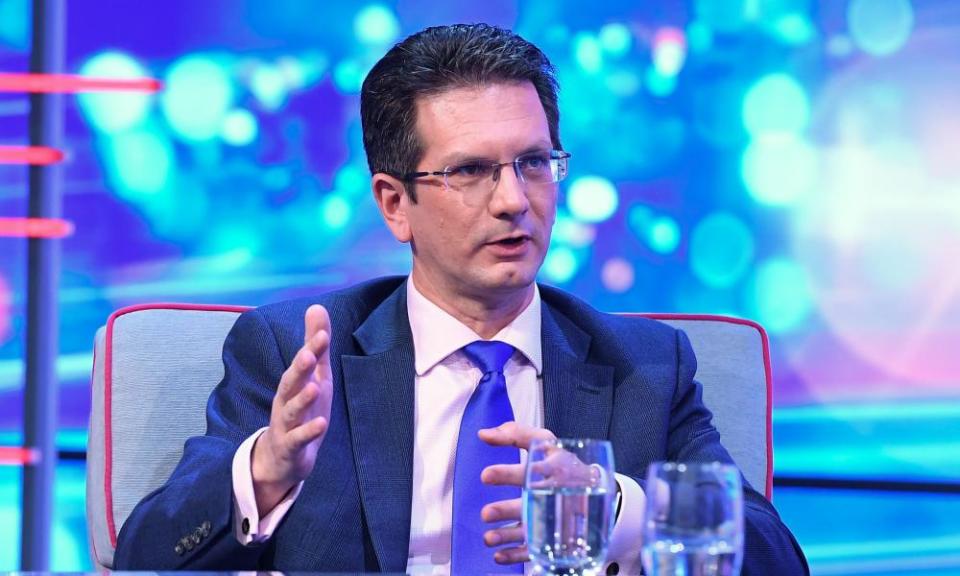At least 40 Tory MPs would reject Chequers-style plan, says ex-minister

The former Brexit minister Steve Baker, a leading Eurosceptic, has said he believes at least 40 Conservative MPs are prepared to vote against Theresa May in parliament if the EU agrees a deal similar to the Chequers proposal.
Baker, who is the vice-chairman of the European Research Group (ERG) of Brexit-backing MPs, said his original estimate of 80 potential rebels was “an accurate number”, but conceded efforts by party whips would be likely to halve it.
Cabinet sources have previously told the Guardian they believe the more likely number to be between 10 and 20 rebels, which would still mean the government needing to rely on Labour votes.
Baker, who quit as a minister in the Department for Exiting the EU alongside David Davis in June, said he was not calling the prime minister’s bluff.
The MP, a leading figure in the Vote Leave campaign during the referendum, said his critics had underestimated the number of MPs prepared to back Brexit in that campaign, but his predictions had proved correct.
“People rolled their eyes when they said I had 100, but about 130 came out, so I always try to be accurate with the numbers rather than have a bluff to be called,” he told BBC Radio 4’s Today programme. “We are in a position as we move forward where colleagues will not tolerate a half-in, half-out Brexit.”
Overnight, the former Tory chief whip and immigration minister Mark Harper, a new member of the ERG, publicly expressed his opposition to May’s proposal. The prime minister should “unite the party around a comprehensive free-trade deal that she can actually get through parliament”, he told the Daily Telegraph.
“We are going to have to carry this deal on our own benches. If you’re the prime minister, you do have to listen to colleagues.”
Baker said MPs should be “unafraid to go forward without an agreement” and the final decision should be made when the legal text of the withdrawal agreement is presented to MPs.
“Of course the government are going to whip this vote extremely hard, but what I would say is the whips would be doing incredibly well if they were to halve the numbers, and my estimate is there are at least 40 colleagues who are not going to accept it … or indeed a backstop that leaves us in the internal market or customs union, come what may,” he said.
Brexit-backing MPs also take particular exception to the backstop in the withdrawal agreement, where the whole of the UK could stay in a customs union for an indefinite period after Brexit to avoid a hard border on the island of Ireland, should no alternative solution be reached.
The government is also ready to accept there may be regulatory divergence between Northern Ireland and the rest of the UK after Brexit – if that is acceptable to Stormont.
Baker called the Chequers proposal, which would create a new free-trade area for goods governed by a common EU-UK rulebook, a “half-in, half-out Brexit” and said MPs would not accept any version of a withdrawal agreement that either constrained trade or divided the UK.
“I don’t doubt every possible technique is going to be used to sow doubt in colleagues’ minds and to encourage them to vote with the government. But in the end, the EU is not entitled to split the UK and it’s not entitled to constrain how we manage the economy and govern ourselves after we leave,” he said.
Baker’s comments came after the former Ukip MP Douglas Carswell, a fellow member of Vote Leave, said MPs should reconsider their opposition and the priority was ensuring Britain’s departure on orderly terms.
“I hope that some of the more excitable Eurosceptic backbench MPs don’t one day look back with regret at turning down a Brexit deal that allows for incremental divergence,” he tweeted.
“The more I hear about the tactics of the ERG, the more convinced I am that Vote Leave MPs need be prepared to back a deal, however imperfect. They’ve had two years to sort out any leadership issues – and consistently failed to. Make do and mend tactics are now the consequence.”
The Brexit secretary, Dominic Raab, is expected to update MPs on the state of the negotiations with the EU later on Tuesday.
On Monday, Downing Street downplayed the optimism expressed by senior officials in Brussels about the talks and suggested there was little chance of an agreement being reached at the October summit of EU leaders next week.
A political declaration had been due to be discussed by the European commission’s 28 commissioners on Wednesday, and shared among the member states. That is now likely to be pushed back until next week, and a planned meeting between Raab and Michel Barnier, the EU’s chief Brexit negotiator, is also now uncertain.

 Yahoo News
Yahoo News 